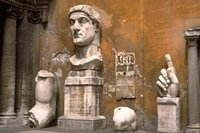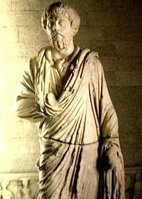
Herodian of Antioch's
History of the Roman Empire is an important source for the AD 180-238 period. Choose one of the emperors from this period (possibilities include Commodus, Pertinax, Didius Julianus, Septimius Severus, Macrinus, Bassianus, and Alexander Severus) and note what Herodian has to say about that emperor. Cite here an example of that emperor's competence (or lack thereof) and an example of the difficulties that emperor faced, looking especially for problems that emperor had with the Roman army.
If you prefer, you might comment on one of the important women leaders, e.g., Julia Maesa or Julia Mamea. You might also like looking at what Herodian has to say about Xenobia, the queen of Palmyra.
You may find the site linked here a bit difficult to navigate. Persevere! Use the "page" button at the top to navigate through the eight *books* of this history looking at the book heading to see which emperors are included in that book. Once you find the right book, click through each of the chapter links to find the material on the emperor you want to talk about.
 Later Chrisitan writers felt it important to answer Julian the Apostate's criticisms of Chritianity in his book Against the Galileans. They quoted liberally from the book, and, partly because of their interest, we have substantial portions of a book that might otherwise have been lost.
Later Chrisitan writers felt it important to answer Julian the Apostate's criticisms of Chritianity in his book Against the Galileans. They quoted liberally from the book, and, partly because of their interest, we have substantial portions of a book that might otherwise have been lost.




